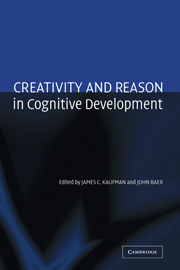Introduction
Published online by Cambridge University Press: 19 January 2010
Summary
Every child is an artist. The problem is how to remain an artist once he grows up.
– Pablo PicassoPicasso is only one of many who have recognized that the transformation from a child into an adult entails losses as well as gains. Children may become both more able and, in some ways at least, less able as a part of normal development. This perspective is not limited to modern times or even to the Western cultural tradition. In a very different time and place, Chuang Tzu observed that in leaving childhood we “forget our way home” (quoted in Egan, 2002, p. 112), suggesting that in taking on more adult ways of thinking we lose the imaginative freedom we had as children. Does the development of knowledge and analytic thinking take a toll on creativity? Or can reason and rhyme coexist and be mutually beneficial?
The idea that knowledge, reason, and creativity are somehow at odds is hardly an uncommon notion, nor is it confined to the arts. Spontaneity and freedom from constraint, which characterize the thinking of children, may be essential to creativity; yet we know from both research and common sense that effort, practice, and study are also necessary for the highest levels of creative accomplishment (Hayes, 1989; Kaufman & Baer, 2002; Weisberg, 1999). The relationship of creativity to domain-based skills and knowledge is no doubt complex, and some have even gone so far as to argue that too much education and training can have a negative impact on creativity (James, 1908; Simonton, 1984; Weisberg, 1995).
Information
- Type
- Chapter
- Information
- Creativity and Reason in Cognitive Development , pp. 1 - 4Publisher: Cambridge University PressPrint publication year: 2006
